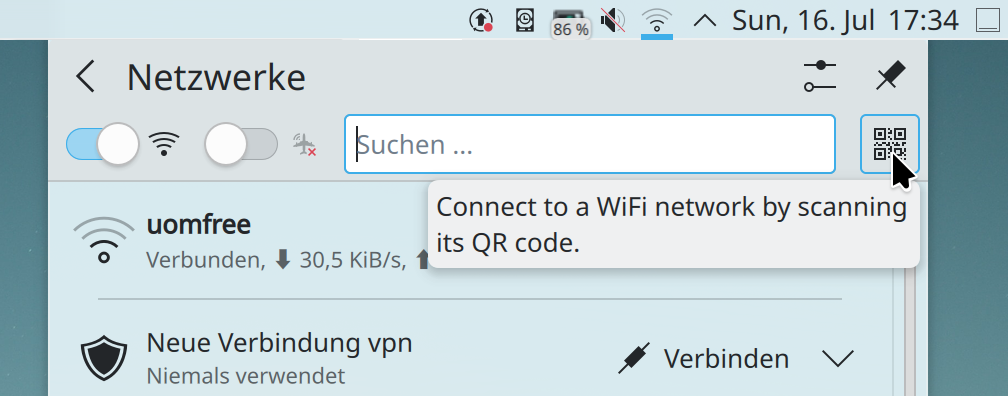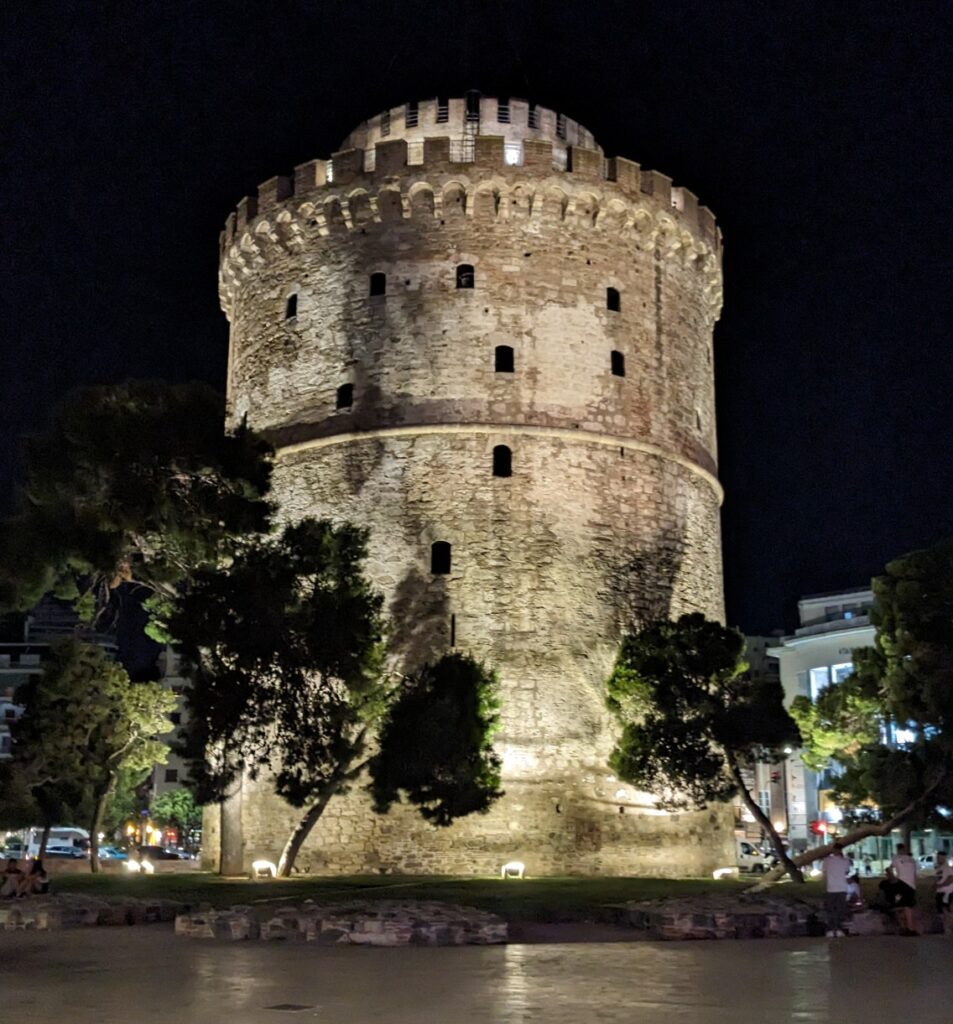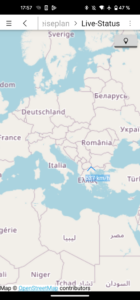I just returned from blazing hot Thessaloniki, Greece where the KDE Community’s annual conference Akademy was held this year. Unlike last year I stayed in the same hotel as many fellow KDE people so the pre-Covid Akademy vibes finally returned in the form of evening hotel lobby hacking. Sadly, I caught a gastrointestinal infection on Monday which made me fly home early and miss the day trip to Mount Olympus I had been looking forward so much.

Whilst on the flight, I inspected how the Aegean on-board Wifi portal worked so I could feed the airplane’s position into KDE Itinerary’s live status page. Our digital travel companion app can talk to various onboard APIs, such as the ICE Portal, to display position and journey information alongside your itinerary. By the way, we now have a fantastic landing page KDE for Travelers which tells you about all the goodies we have that can make travelling the world more pleasant. We were also quite happy to find that Aegean provides an update endpoint for their Apple Wallet passes so we can notify about gate changes and departure delays, something we have only experienced with Lufthansa so far.
The conference opened Saturday morning with a keynote from the Libre Space Foundation on how they got open-source solutions into space. After the first of many coffee breaks, Adam, Carl, Joseph, and Nate gave an interim conclusion on the current KDE Goals. After that I attended Volker’s presentation on how the KDE Eco iniative measures the energy consumption of our software. The afternoon talks I listened to were mostly centered around KF6 and Plasma 6, which is going to be huge! Sadly, I missed the presentation on Slint UI that ran parallel. Finally, for those of you who are developing embedded devices, CoLa gave an introduction to KDE’s Yocto offerings.
As with the previous year, the Wifi password for the venue was printed onto our attendee badges which made me resurrect my attempt at adding a QR code scanner to the Network applet – this time using the redesigned Qt Multimedia APIs in Qt 6. This feature already exists in Qrca, our barcode scanner app, but I needed to split up the code and move it KDE Frameworks so I could use it from within Plasma. Incidentally, a permanent “You need to log in to this network” hint has been added above the network list when behind a captive portal in case you dismissed the popup notification prematurely or want to deal with it later.
One thing I only learned during the Plasma 6 presentation was that there’s actually work being done to support the XDG sound theme spec within KNotification. This is something I have wanted for the longest time and even put that on my 2023 wishlist. I am sick and tired of hearing those Oxygen sounds we’ve had for the last 15 years. In fact, the lack of good device-added and device-removed sounds is why I never implemented the ubiquitous audible feedback when plugging in and out a USB device. Plasma 6 now has this!

Another Plasma 6 feature that is a direct result of this year’s Akademy being located in a different time zone from Central European (Summer) Time is automatically adjusting the clock based on your physical location. Our phones just do that using the cellular network and we don’t even think about it. Frequently during the conference people were confused which talk will come next when their laptop and phone disagreed on the time. For privacy, this will use KDE’s own GeoIP endpoint and of course be opt-in and disabled when connected to a VPN or metered connection.
Sunday morning was the only time I actually walked to the venue, it was just too hot and I didn’t want to be dripping sweat already at the start of the day. The second conference day kicked off with a presentation by the Kdenlive developers with lessons learned from 20+ years of development. Joseph did an interactive talk about communication within the KDE Community with lots of questions to the audience, I really enjoyed that. After lunch and the group photo (which sadly isn’t published yet at the time of this writing) Arjen demoed a project which does remote desktop under Wayland. After that Neal Gompa of Fedora spoke about their experiences with Plasma on Wayland and that they will switch to Wayland by default with Plasma 6.
While last year we showed the first carefully crafted Plasma 6 demo, this year I am running its Wayland session full time. It has definitely made a huge leap in production-readiness since I made the switch to it six weeks ago and I can only encourage you to give it a try! Actually, most of the quirks I mentioned before have since been fixed or will be addressed in the upcoming Qt 6.6 release.
There have been four 10-minute lightning talks this year. Jean-Baptiste Kempf of VLC demoed Kyber, a cross-platform open-source low latency remote control software, which lets you stream for example games from another computer running Windows. It looked very promising but regrettably it’s not ready for prime-time yet, so no source code or beta release was provided. Fabian Kosmale of The Qt Group showed how qmllint evolved from a simple command-line tool to something that we really should add to our CI pipeline to raise the quality of our QML code.

My talk (in which the Plasma 6 Wayland session performed flawlessly) revolved around getting solar energy data into system monitor. It should serve the KDE Community as an inspiration that while we have world travel covered with KDE Itinerary, KPublicTransport, KTrip, we don’t offer much in the area of home automation. Finally, Nate discussed the controversial topic of “first-run wizards”, which we now have in the form of the Plasma Welcome Center. The day ended with speeches by our generous sponsors and the Akademy awards. Among others, Milian received an award for creating Heaptrack, an excellent memory profiler, which also helped me save the day more than once.
The week that follows the talks is usually packed with discussions, workshops, and trainings. On Monday we had discussions on KDE’s messaging infrastructure, a follow-up to Volker’s energy measurement talk, meetings around Plasma Mobile, NeoChat, Wayland showstoppers, and Qt6-porting. In between those I spent time in the “chill-out area” (they set up chairs and tables in the gymnasium) to do some KRunner experiments and more Network applet improvements.
Tuesday I started feeling sick and after the morning KRunner, Dolphin, and Plasma BoFs I went back to the hotel and spent mostly in bed and decided to rebook my flight and fly back home early. Other than that it was a great couple of days with lots of new faces, great talks, good collaboration. Thanks to the organizers and sponsors who made this event possible! Can’t wait to see you all again next year.

Hello, thanks for all the great work. Is WPS Wifi connexion planned in network applet ?
Nope, not planning on that, sorry.